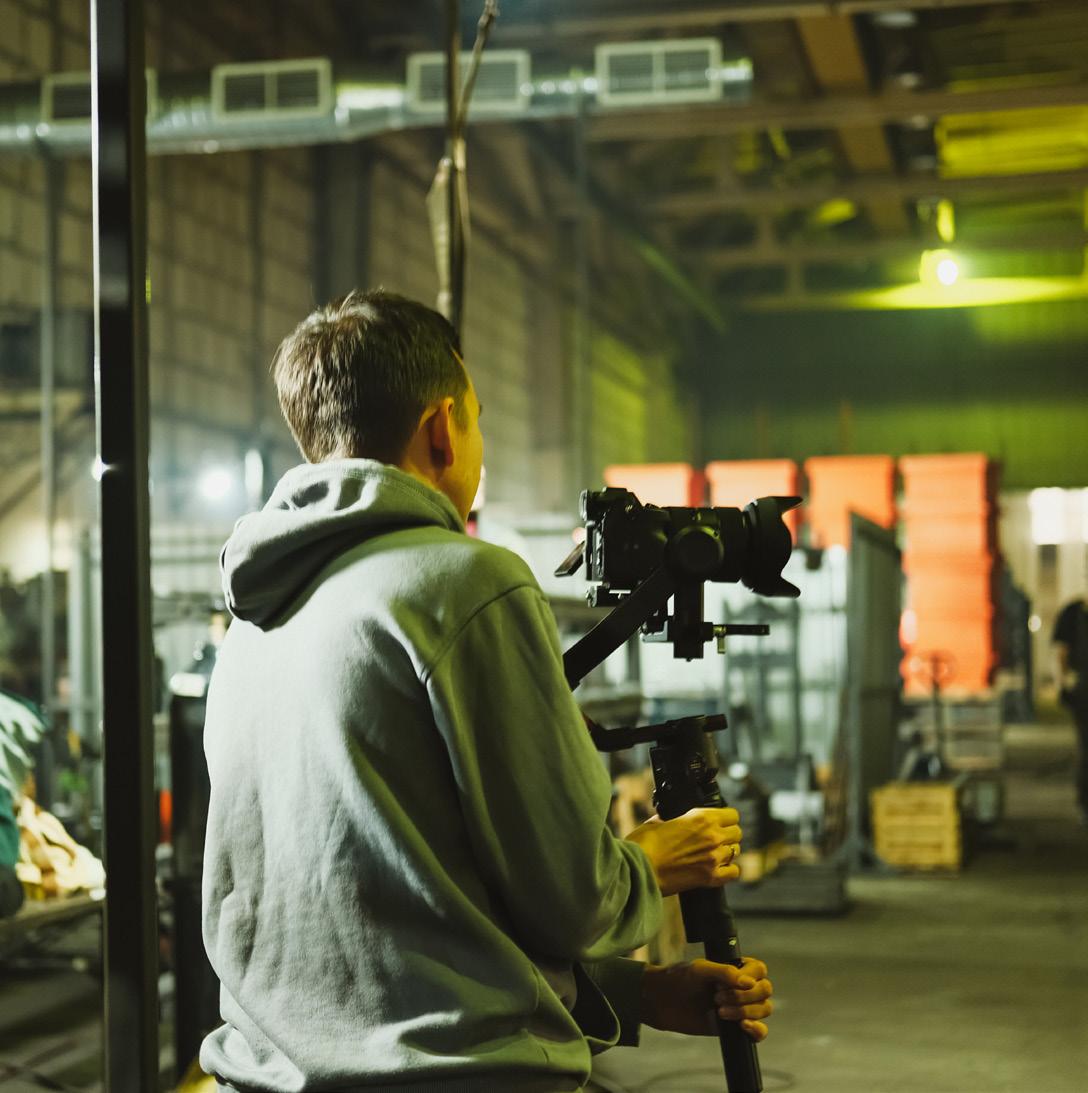Creating Change
The small business pitch to support the creative sector

Published: November 2025


Published: November 2025
The UK is a world leader in the creative industries, which contributed £123 billion of Gross Value Added to the UK economy in 2024 and continues to be a source of economic growth and soft power.1
The sector is made up of over 93 per cent micro businesses with significant real-world impacts across the UK,2 vital for local economies, cultural scenes and high streets. Protecting our existing industry is key so it can continue to be a source of growth and international competitiveness for the UK, including as users of our burgeoning domestic AI sector.
For the purposes of this report, we define the creative industries sector as those working in art, fashion, photography, craft, media, publishing and entertainment, advertising, marketing, PR, computer programming, consultancy and related activities. This reflects the sector definition used by the Department for Culture, Media and Sport.3
This report looks at the challenges and opportunities facing small businesses in the creative industries, highlighting the most impactful interventions for UK policymakers to help this sector to flourish – now, and in the future.

Small creative businesses see significant potential benefits from AI (75%), but have concerns about abuse of their Intellectual Property (IP) rights (30%) and the impact of deepfakes on their brand or reputation (18%).
A further 17 per cent have concerns about how AI will affect the long-term viability of their business.4 Updating the IP regime is necessary to protect our creative industries and equip them to make the most of new technologies, confident that the tools they use respect the IP of their fellow creatives.
“Every citizen needs their rights protected, whether it’s face or voice. From a voiceover perspective, whether it’s commercials or audiobooks, we need something in place to protect our rights. I want to work in this country, I want to pay my taxes, to contribute. But if we don’t have something in place now, a lot of people will lose their voices.”
Small business owner, Voice actor, South West England.
“I’m an actor and, like many, I use my creative skills in a side hustle to get by. I have a copywriting business, but in the last year the jobs have just dropped away. The industry is already difficult, but now our side hustles are going too. Protecting personality rights like they have in Denmark is a bare minimum. More forethought into the ripple effect of AI on jobs is vital.”

Small business owner, Actor & copywriter, South East England.
• Voice and image rights to protect creators from deepfakes: The Government should create a new and exclusive IP right to the voice and/or image of an individual, to prevent their exploitation by others for commercial or criminal purposes through the use of deepfakes. This could also include defining such usage as an ‘unfair business practice’ carrying a compensation right, in the same way as many unfair practices are prohibited under UK law to protect consumers. This could build on work in some US states and Denmark.
• Watermarks and disclaimers for AI-generated content: Valuing human creativity means that we must be able to recognise it, something that is becoming increasingly difficult as generative AI tools improve. The Government should introduce legislation that ensures that all AI-created output shared without any human making changes to the output has a watermark or disclaimer inserted that clearly outlines that the content has been generated solely by AI. A watermark would be visible on AI-generated images, and a disclaimer automatically included when text is pasted directly from a chatbot. This would be a duty on technology companies, which could be monitored and enforced by regulators.
• Protect creatives through the AI / copyright consultation outcome: Earlier this year, the UK Government held a consultation on how to adjust the UK’s copyright regime to reflect the challenges and opportunities posed by AI.5 Small creators must be placed at the heart of any changes so they are able to control how their content is used in practice. Any tools developed by Government must undergo extensive testing with small businesses before being deployed more widely. This must be accompanied by effective enforcement of copyright laws to protect creators’ work from misappropriation and misuse by developers of AI foundation models. The Creative Content Exchange outlined in the Creative Industries Sector Plan must also cater to the needs of small firms and allow creators to gain meaningful compensation for their work.6

Small production businesses are an important source of growth in the UK economy, with provisional estimates showing that the film, TV, radio and photography subsector brought £21.2 billion Gross Value Added into the UK economy in 2023.7
As journalistic models shift away from broadcast media and towards on-demand content like podcasts, new opportunities are arising for the smallest production businesses to contribute to public service broadcasters’ missions and fuel growth in local economies, including by supporting the development of micro-clusters outside of existing agglomeration areas. Where public money is spent on commissioning, this should be used to support the small independents that form the basis of the UK film and TV subsector.
• Require public service broadcasters to spend at least 33 per cent of their commissioning budgets with small independent producers: There should be a requirement on public service broadcasters to spend at least 33 per cent of their budgets on small independent production businesses, and to include this percentage in their published annual accounts.8 For example, the BBC could use its 2027 Charter Review to embed this principle into its operations - not only in its commissioning budget of over £1.6 billion,9 but also its broader spend of over £3.6 billion. Ofcom could reflect this requirement in relation to commissioning spend in their production quotas. For example, with the recent shift to production quotas in absolute spend and hours,10 this could be a target developed annually for each broadcaster based on 33 per cent of their commissioning spend in the previous year. In addition, Ofcom could publish an annual ranking showing broadcasters’ progress as a percentage of commissioning spend in its public service broadcasting annual compliance report,11 to encourage public service broadcasters to compete for best practice.

Challenge:
51 per cent of small businesses in the creative industries are sole traders or freelancers.12
However, only 54 per cent of small creative business owners were able to set their business up within 12 months, and 20 per cent say that better access to Universal Credit (UC) for the selfemployed would improve their ability to start or grow a business.13

Solutions:
• Double the start-up period under UC: Successful businesses take time to build. The start-up period under UC minimum income floor should be increased to two years. So that fluctuating income does not reduce self-employed creatives’ earnings, the UC award should be calculated on a selfemployed individual’s income for the previous year rather than month to month.
• Smooth freelancers’ income tax liability to support project work: Freelancers often work on projects with gaps in between, so their tax liabilities vary month-to-month. The Government should introduce a system whereby the selfemployed can smooth their tax liabilities over a three-year rolling average through the availability of tax credits. This would be particularly impactful for those that work on a project basis, such as freelance technicians working on films.
“There’s always a fear if I get a letter from HMRC that it’ll be a demand for more money based on my recent projects. It’s just backwards and forwards, them paying me, me paying them. It would be better if I felt there was a bit more consistency to it.” Small business owner, Graphic design, London.
32 per cent of small businesses in the creative industries in England say that Small Business Rate Relief (SBRR) on business rates is essential, and their business would not survive without it.14
However, many small creative businesses need significant space to operate, such as workshops and warehousing. If the threshold for SBRR is increased so that premises with a rateable value of up to £25,000 are eligible, 38 per cent of small creative industries businesses in England would invest more in their business, including by hiring additional staff (18%), investing in advertising and marketing (18%) and upgrading technology and equipment (15%).
• Reduce business rates for small creative firms: Small creative businesses are vital for opening up town centres and revitalising local high streets. Yet while many small creative firms require significant space, such as studios and workshops, they are often not covered by the 40 per cent relief on business rates for Retail, Hospitality and Leisure in England. The SBRR threshold in England should be increased from its current level of £12,000, to £25,000 to help small creative businesses access the space they need to thrive.
“We would like to have our own business premises again with the space to scale and grow, but with business rates and all the other cost pressures it’s just not affordable.”
Small business owner, Fashion, Scotland.
• Adjust the business rates regime to encourage small firms to share space: Small businesses in shared workspaces are losing vital SBRR due to a Valuation Office Agency (VOA) change following a legal ruling. The new method values all firms in shared workspaces as one, disqualifying individual businesses from relief. Up to 150,000 more small firms in shared studios, workshops, and markets could be affected in April’s revaluation. The Government should use its power to end this unfair policy and create a fair business rates framework for flexible workspaces that protects small firms’ eligibility for SBRR.

Creative business owners face barriers to accessing public funding.
Reasons for not applying for government funding include concerns that the application process is too bureaucratic or time-consuming (38%), not being aligned to their business needs (26%) and low chances of applications actually being successful (22%).15

• Improve access to Arts Council England (ACE) support for small creative businesses: ACE should refocus its Grant-in-Aid funding on small creative businesses and remove unnecessary barriers to business applications. This should include shortening the application process and creating a fast-track for smaller projects led by small organisations, so that application length and complexity is proportionate to the level of support provided.
• Expand successful ACE programmes for small creative businesses: Successful schemes targeted at businesses, such as Developing Your Creative Practice and Get Ready for Business Growth, should be expanded.16 ACE should also consider developing a larger-scale Small Business Creative Fund, designed in consultation with sector experts – creatives themselves.
“As a published composer and orchestrator, I’ve worked with creatives from across the UK. It’s clear that while Arts Council England provide lots of valuable support, most of it goes to the third sector charitable bodies and isn’t really accessible for small businesses. That means that if you’re a small creative business starting out, working from your kitchen table, you are unlikely to be able to access support, even though your business might be really important to the economy or arts scene and have the potential to build an international audience or clientele.”
FSB member, Composer & orchestrator, Scotland.
Half of small creative businesses (50%) experienced late payment in the third quarter of 2025.17
Creatives, like other entrepreneurs, are being forced to spend their time chasing invoices rather than growing their businesses. We welcome the Government’s late payments consultation as a unique opportunity to eliminate this drag on the UK economy.18
• Require board-level scrutiny of payment performance by the largest businesses: As proposed in the Government’s late payment consultation, audit committees should be required to provide commentary and deliver recommendations to company directors before payment performance data is submitted for inclusion in directors’ reports. For the largest businesses without a formal audit committee, they could comply through the appointment of an alternative ‘responsible individual’ on the board. This requirement should apply not only to publicly listed companies and those required to maintain an audit committee, but to all organisations currently subject to the duty to report their payment practices.19
• Enhance powers of the Small Business Commissioner (SBC): In line with the measures proposed in the late payments consultation, the SBC should be given a significantly expanded role enabling them to carry out spot checks and compel disclosure of information; assess the degree to which businesses are fulfilling the new requirements around audit committee (boardlevel) scrutiny; where relevant refer issues to DBT for enforcement; issue fines to firms which are non-compliant; and initiate investigations based on anonymous tip-offs or publicly available data.

This report was written by FSB Policy Advisor Iliana Pearce, with thanks to all who supported within FSB’s media, government affairs, and policy teams, and in particular Matthew Rooke, FSB Board member and staunch advocate for the creative industries. Thank you also to all the FSB members and others who fed into the research.
The report was designed by Cactus Design Limited – a small business based in Wales.
The Federation of Small Businesses (FSB) is a non-profit, non-party-political grassroots business organisation that represents small business and self-employed members in every nation and region of the UK. FSB provides its members with a wide range of vital business services including advice, financial expertise, legal support and a powerful voice heard in Government for over 50 years.
1 Department for Culture, Media and Sport, DCMS Economic Estimates: Monthly GVA (to December 2024), February 2025, https://www.gov.uk/government/statistics/dcms-economic-estimates-monthlygva-to-december-2024
2 Department for Culture, Media and Sport, DCMS economic estimates: Business demographics, 2024 – main report, December 2024, https://www.gov.uk/government/statistics/dcms-economic-estimatesbusiness-demographics-2024/dcms-economic-estimates-business-demographics-2024-main-report
3 Department for Culture, Media & Sport, DCMS Sectors Economic Estimates Definitions, July 2025, https://www.gov.uk/government/publications/dcms-sectors-economic-estimates-methodology/dcmssector-economic-estimates-methodology
4 FSB, Small Business Index Quarter 3, September 2023, https://www.fsb.org.uk/resources/reports/smallbusiness-index/small-business-index-quarter-3-2023-MCNILHIJWRRRBB3AHZHLSGFIIFJI
5 Intellectual Property Office, Department for Science, Innovation and Technology, and Department for Culture, Media and Sport, AI copyright consultation, December 2024, https://www.gov.uk/government/ consultations/copyright-and-artificial-intelligence/copyright-and-artificial-intelligence
6 Department for Business and Trade and Department for Culture, Media and Sport, Creative Industries Sector Plan, June 2025, https://www.gov.uk/government/publications/creative-industries-sector-plan
7 Department for Culture, Media and Sport, DCMS Economic Estimates GVA 2023 (provisional), February 2025, https://www.gov.uk/government/statistics/dcms-economic-estimates-gva-2023-provisional
8 As elsewhere in this report, we use the term ‘small’ to refer to the full range of businesses with up to 249 employees. This would exclude most of the super-indies.
9 BBC, BBC Commissioning Report 2024/25, July 2025, https://www.bbc.co.uk/commissioning/ documents/bbc-commissioning-report-202425.pdf
10 Ofcom, Statement: Proposals to update the PSB quotas, May 2025, https://www.ofcom.org.uk/tv-radioand-on-demand/public-service-broadcasting/consultation-proposals-to-update-the-psb-quotas
11 Ofcom, Public service broadcasting annual compliance report: 2025, July 2025, https://www.ofcom.org. uk/tv-radio-and-on-demand/public-service-broadcasting/annual-report-2025
12 FSB, Small Business Index Quarter 2, 2025, https://www.fsb.org.uk/media-centre/press-release/for-firsttime-more-small-firms-expect-to-shrink-than-grow-fsb-report-MCE6YQJ2KESVDRHDLFQOXFX5T32Y
13 FSB, Entrepreneurs, start-ups and business growth, December 2024, https://www.fsb.org.uk/resources/ policy-reports/entrepreneurs-start-ups-and-business-growth-MCBX5USEDCLNGGVC4IHDEB42ZHSQ
14 FSB, The Future of the High Street, August 2024, https://www.fsb.org.uk/resources/policy-reports/thefuture-of-the-high-street-MCV2JL7NJLIVEX7BBLFHGMZ32XVY
15 FSB, The Tech Tonic, August 2023, https://www.fsb.org.uk/resources/policy-reports/the-tech-tonicMCKYQV5I5XCFGN5G7G6KKLGSLC7E
16 Arts Council England, Grant-in-Aid and Lottery distribution annual report and accounts 2024/25, July 2024, https://www.artscouncil.org.uk/arts-council-england-grant-aid-and-lottery-distribution-annualreport-and-accounts-202425
17 FSB, Small Business Index Quarter 3, October 2025, https://www.fsb.org.uk/media-centre/ press-release/small-business-growth-hopes-plunge-chancellor-must-act-in-budgetMCJHXGO335K5HPPF27EKA3M5NIMM
18 Department for Business and Trade, Late payment: tackling poor payment practices, July 2025, https:// www.gov.uk/government/consultations/late-payments-tackling-poor-payment-practices
19 Department for Business and Trade, Duty to report: guidance to reporting on payment practices and performance, September 2025, https://www.gov.uk/government/publications/business-paymentpractices-and-performance-reporting-requirements/duty-to-report-guidance-to-reporting-on-paymentpractices-and-performance. The size criteria are based on turnover, balance sheet total, and number of employees. For financial years starting on or after 6 April 2025, the thresholds are £54 million annual turnover, £27 million balance sheet total, and 250 employees – being in scope when 2 of these three conditions are met.
© Federation of Small Businesses 2025
fsb.org.uk
@fsb-uk
FSB UK
@fsb_policy
If you require this document in an alternative format please email: accessibility@fsb.org.uk
All rights reserved. No part of this publication may be reproduced, stored in a retrieval system, or transmitted in any form or by any means, electronic, mechanical, photocopying, recording or otherwise, without prior permission of FSB. While every effort has been made to ensure the accuracy of the facts and data contained in this publication, no responsibility can be accepted by FSB for errors or omissions or their consequences. Articles that appear in the report are written in general terms only. They are not intended to be a comprehensive statement of the issues raised and should not be relied upon for any specific purposes. Readers should seek appropriate professional advice regarding the application to their specific circumstances of the issues raised in any article. This report can be downloaded from the FSB website at www.fsb.org.uk